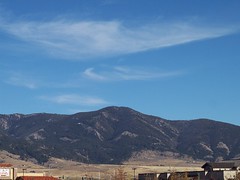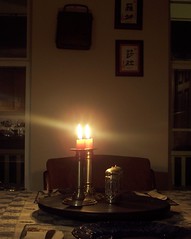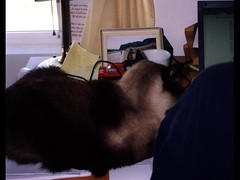Is it possible to add anything new to the same-sex marriage debate? Probably not, but I will try anyway. I have these thoughts that have been bouncing around in my head now for the last few months...
Sometimes I wonder what would happen if we stopped talking about "marriage" and came at this from a slightly different direction.
Family
Take a look at the word "family". It has
never exclusively meant husband + wife. It currently frequently means husband + wife + children, but I don't think even most wingnuts would suggest that single people don't have families since they obviously have parents, sisters, brothers, aunts, uncles, and countless others to whom they are related.
Next, lets talk about the concept of your "legal family". That is, the people that the government and other institutions recognize as being "related" to you. These institutions only care in certain circumstances - say you are in the hospital and someone needs to make decisions on your behalf. Your legal spouse is probably first in line*. If you have no legal spouse, then there are others in line. I have no idea the priority here -- brothers, sisters, etc. If all your close relatives are dead, then maybe the person making these decisions is your third cousin that you only met once ten years ago.
Anyway, in all of the ways in which people are related to one another, marriage is unique in that two completely (in most cases) unrelated people suddenly become related...and in the way that
trumps all others. You don't get to choose your parents or siblings or cousins...but you do get to choose your spouse. Even in arranged marriages,
someone is choosing the spouse...the relationship does not merely spring from the luck of genetics.
When I talk about why I want same-sex marriage, why I think it is an issue of justice, it all boils down to this concept of family. I consider my partner to be part of my family...but in the eyes of the law she is a complete stranger. My parents, my sister, my sister's children, my distant cousins I barely know - all these people are higher on the list of "related-ness" to me than the person with whom I share my life and entangle my finances. I would like some means to say "this person is now related to me; she is now part of my family in a legal sense."
The reasons I want this ought to be obvious. I would like her to have priority over all those other folks in line, both for practical reasons (that hospital situation I mentioned) and for symbolic reasons (I do not consider myself to be single. I don't want people to treat me as though I am single).
Currently, the only way I know of to make two
unrelated adults
related according to the law is via marriage.
What About Civil Unions and Contracts?
"Civil unions" could potentially also accomplish this feat of making non-relatives into relatives. However, they currently exist in very few places (Vermont and California, as far as I know) and do not bring along all the rights and responsibilities that go with marriage. I don't know whether they have the power to create a legal family or not.
Regardless, many of the people who argue the most against same-sex marriage are equally opposed to civil unions. For example, note this from an article about the five year anniversary of the
Vermont civil union law:
"The following election year, after a virulent national backlash campaign, seventeen Vermont lawmakers who supported civil unions lost their seats. The newly-elected Republican majority in the House attempted to impeach the Vermont Supreme Court and overturn the civil unions law. But, ultimately the campaign to 'Take Back Vermont' failed, and civil unions remained in effect. "
Yes, the move to overturn civil unions failed, but there were still wingnuts calling "the decision 'worse than terrorism.'" Furthermore, the text of several of the anti-gay marriage amendments passed this past November also
outlaw civil unions.
Other options - well, a collection of legal documents might be able accomplish a few of the practical goals, such as the hospital scenario. Although even those solutions are under attack in some places, such as Ohio after the passage of its anti-gay marriage law. From an
FAQ on the amendment:
Will unmarried senior citizens be the only group to lose the right to jointly own property and convey power of attorney over health care matters? A: No. Issue 1 takes that right away from all Ohio’s unmarried adult couples regardless of their age or their walks of life. So vague and ambiguous is the language that constitutional legal experts agree that Issue 1 will bring decades of legal headaches for unmarried couples young, old. Issue 1 removes the right for unmarried couples to have their wishes be fulfilled with regards to health care, property rights.
We also can't forget about this
nasty law passed in Virginia:
A civil union, partnership contract or other arrangement between persons of the same sex purporting to bestow the privileges or obligations of marriage is prohibited. Any such civil union, partnership contract or other arrangement entered into by persons of the same sex in another state or jurisdiction shall be void in all respects in Virginia and any contractual rights created thereby shall be void and unenforceable. [emphasis mine]
As Eugene Volokh notes:
This doesn't just block courts from recognizing out-of-state civil unions, or creating special in-state civil union status. It also bars purely private contracts, if they "purport[] to bestow the privileges or obligations of marriage." The phrase contract or other arrangement . . . purporting to bestow the privileges or obligations of marriage" is pretty vague, but presumably it would include, among other things, contracts to share property that will be acquired in the future, contracts obligating one party to support the other, wills that devise property to the partner, and so on -- all benefits and obligations that some states automatically confer on married couples.
Needless to say, I won't be visiting Virginia anytime soon. Anyway, I imagine many of the folks who insist that we don't need civil marriage because we can get private contracts would be perfectly happy to see those contracts become unenforceable.
Even in decent states that recognize our contracts, a power of attorney or health care proxy, or what have you, does not make a person into a relative. You are still legal strangers, but with a few agreements written down.
It is all very simple really. If I and another adult are willing to assume the responsibilities of becoming a family, we should be able to do so. The related rights should come along. If you have a means to do this other than marriage, then please, enlighten me. I'm willing to listen, but I have a hard time imagining anything simpler or more straightforward than a state-issued marriage certificate.
What About Other Relationships?
Viewing marriage through this concept of
family and
relatedness has another advantage in that it neatly addresses a another argument that anti-gay marriage people like to bring up. I call this the "If you take away the male/female definition of marriage, then we have no way to distinguish marriages from any other relationships" argument.
I've seen this one expressed in a number of different ways, most commonly something like this:
"Well, there are other human relationships with love and commitment, but we don't call them marriage" [note, I'm not quoting anyone in particular here, although this argument did pop up several times in this outrageously huge thread. If you really have a ton of time to kill, read the whole thing. I gave up keeping up after about the 300th comment.]
In other words, the maleness/femaleness of marriage is the only thing distinguishing it from "other" relationships, like friendship.
Now, friendship of all sorts is very important to most people and something that I highly value. But it is remarkably easy to draw the line between "I want this person to be related to me" and "this is one of my best friends". I think most people wouldn't have much difficulty making this distinction. Just ask yourself this question - you might adore your best friend, but do you want the
legal responsibilities of making that person a family member?
Keep in mind that even today, in our opposite-sex-marriage-only world, there already is such a thing as "marriage of convenience". As in, a marriage based on something other than love, attraction, desire to make babies, or any other typical reason for marriage. Many of these may be based on nothing more than deep friendship and a desire to combine lives and finances for legal reasons. I personally know of one that is strictly for immigration reasons - although, ironically, the individuals involved are both gay and would not need to have this arrangement if gay marriage were legal.
Would such marriages also occur in a same-sex-marriage world? Probably, but this really doesn't disturb me much. Personally, I would prefer it if people used their opportunity for marriage for a good reason - to make a family, to find joy in life with another human. But, if someone wants to waste this opportunity for a more shallow reason, that is their problem, not mine. And again, this already happens today. Preventing gay marriage
will not prevent marriages of convenience.
And again, the fact that legal marriage brings both rights
and responsibilities would place natural brakes on the impulse to take advantage of marriage law, just as it does today. I think the incidents of, say, a straight man marrying a male friend for financial reasons would be mighty slim. Most single people are not willing to exchange their opportunity for a "real" marriage (i.e., one based on love and all that) for a marriage of convenience for financial or other reasons.
Getting back to the point here, it is pretty easy to see that the maleness/femaleness of the couple does not need to be the only feature distinguishing marriage from friendship or other relationships. The degree of relatedness desired between the couple is also a distinguishing feature.
*Yes, I know this does not always happen. Sometimes the law steps in between spouses...the
Terry Schiavo case is an example of that. In some ways, though, this illustrates the power of marriage in the legal realm - Michael Schiavo would have had no legal standing in this fight had they not been married, or if he were instead a female partner.

































